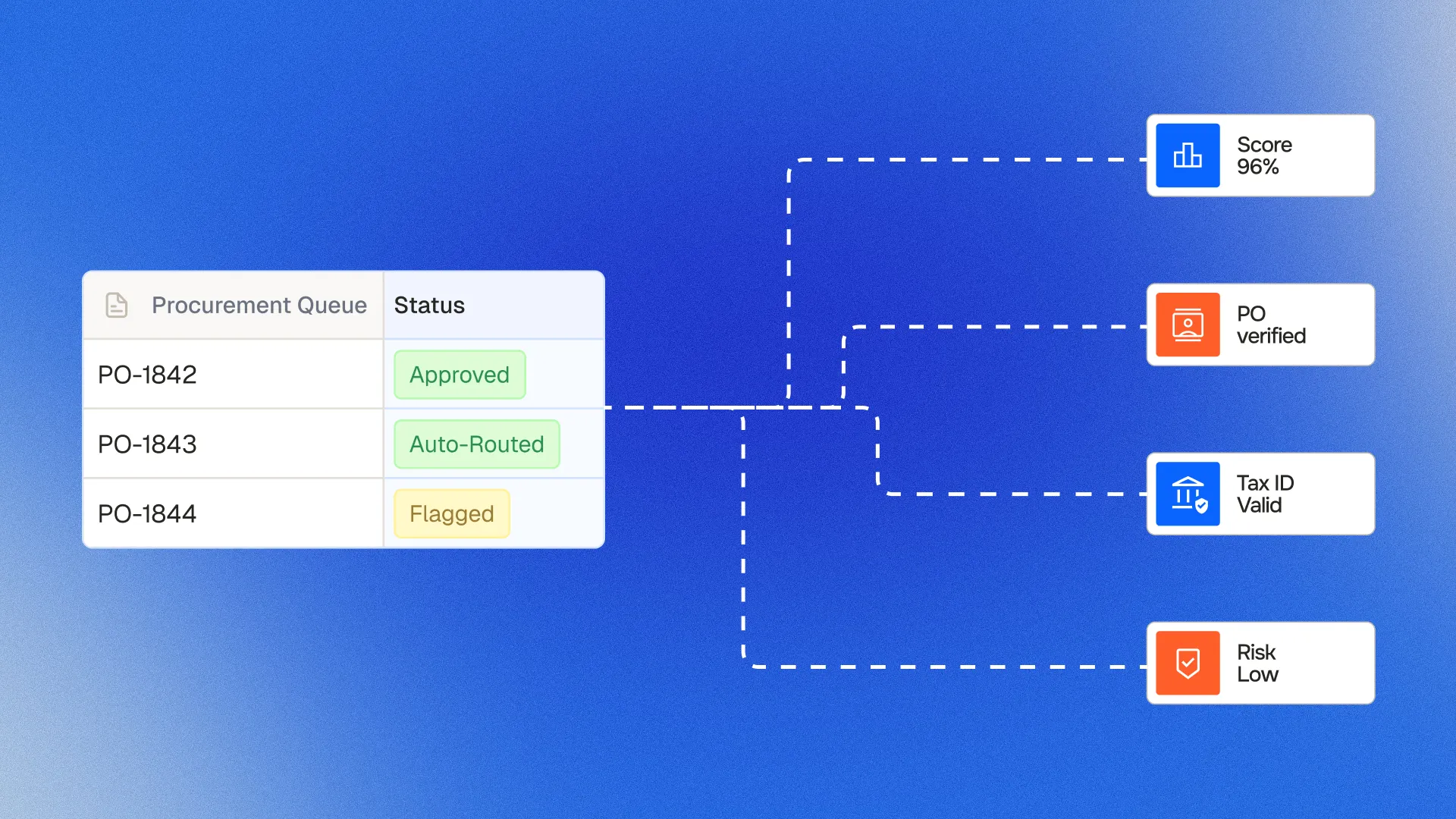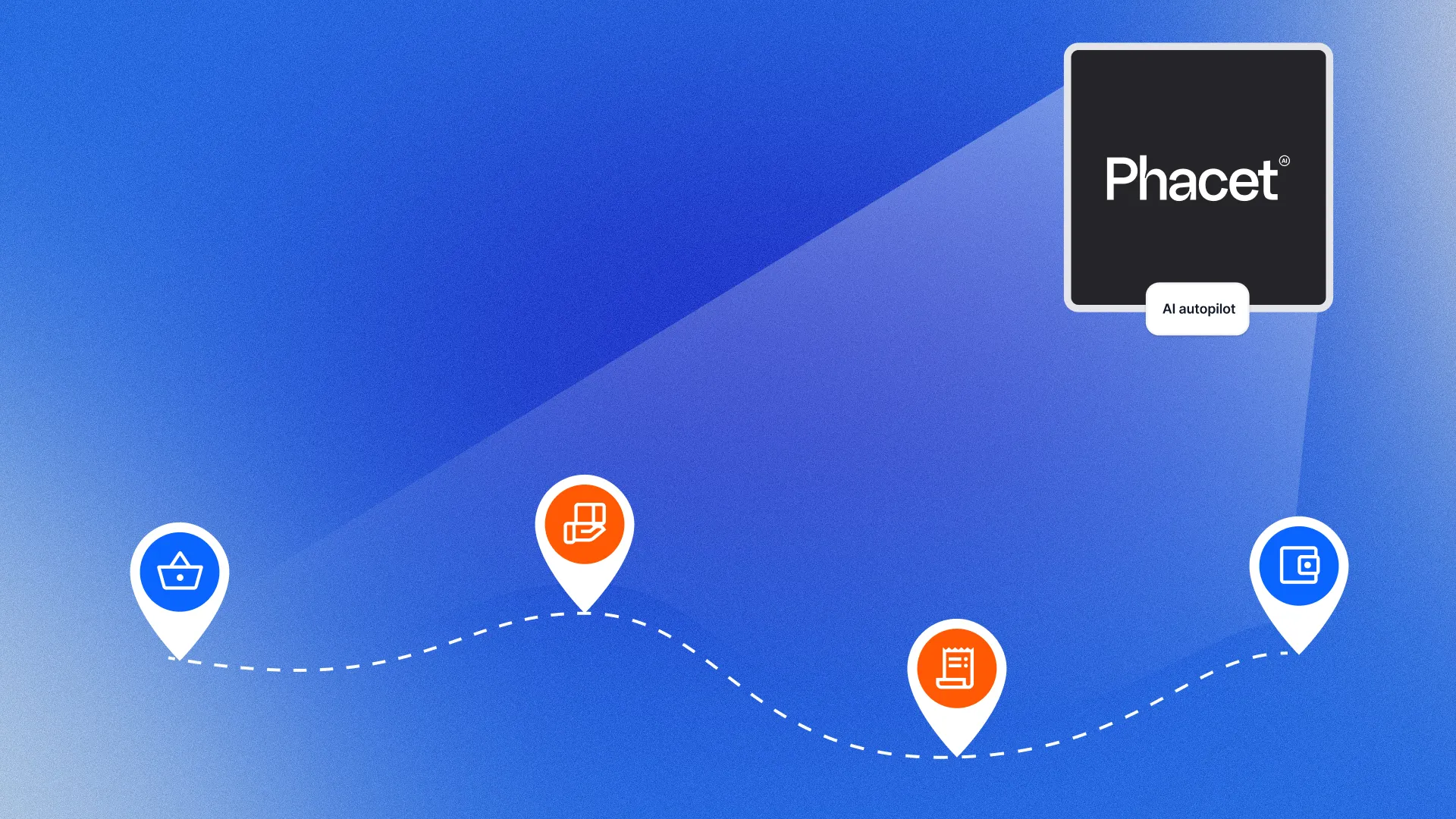
AI agents in finance: the agentic revolution
Published on :
November 21, 2025

The key takeaway: AI agents transform finance from reactive to proactive decision-making. They centralize and automate data collection across systems, drastically reducing errors in reconciliation and fraud detection, while providing real-time insights for strategic roles. By 2028, 33% of enterprise apps will incorporate agentic AI, with 15% of daily work decisions automated, driving efficiency beyond traditional automation.
Finance teams face manual processes, data silos, and reactive decisions, causing costly errors and missed opportunities. AI agents in finance revolutionize operations by autonomously managing workflows, centralizing data, and delivering real-time insights. They drastically reduce manual effort, improve accuracy, and enable proactive decision-making for strategic growth. Intelligent automation frees finance professionals to focus on high-value strategy, transforming finance into a true business partner. These agents turn data chaos into clarity, delivering actionable insights beyond productivity gains. Gartner predicts 33% of enterprise software will use agent-based AI by 2028, the shift is here.
- From automation to autonomy: the rise of AI agents in finance
- Transforming core finance operations with AI agents
- The measurable benefits: beyond productivity gains
- Navigating the challenges of implementation
- The future is agentic: building your intelligent finance function
From automation to autonomy: the rise of AI agents in finance
Beyond traditional automation: a new era for finance teams
Traditional RPA handles repetitive tasks but lacks adaptability for complex decisions. It struggles with unstructured data and requires constant human oversight. Agentic finance represents a paradigm shift, where AI agents autonomously analyze and act on data to transform finance beyond basic automation.
This evolution enables finance teams to shift from transactional work to strategic roles. By automating intricate processes like risk assessment and forecasting, AI agents free professionals to focus on strategic work like business planning.
Tasks that took hours now auto-complete, reducing errors and speeding up workflows.
What are AI agents and why are they different?
AI agents operate with autonomy, processing data and making context-aware decisions. Unlike rule-based automation, they coordinate tasks independently using LLMs and machine learning. They integrate external tools for real-time workflows.
Understanding the purpose of an AI agent is critical for finance leaders. These systems learn, adapt, and decide autonomously.
Unlike generative AI that produces text, agentic AI executes actions. They process transactions, analyze reports, and adjust strategies dynamically.
The shift from reactive to proactive decision-making
These agents analyze real-time financial data, turning chaos into clarity. They identify emerging risks and opportunities before they escalate.
For CFOs, this means moving from historical reports to predictive insights. AI agents continuously monitor market trends, enabling faster, more accurate decisions.
Agentic AI reduces reporting time by 40% and automates compliance checks.
Transforming core finance operations with AI agents
Automating complex procure-to-pay workflows
AI agents transform procure-to-pay workflows by handling end-to-end processing. They extract invoice data via OCR and validate against purchase orders and delivery receipts. This 3-way matching eliminates manual checks and reduces errors dramatically.
Advanced cognitive AI understands nuanced financial contexts, handling complex scenarios like global purchase orders and tax calculations. It learns organizational preferences for autonomous matching. This cuts processing time by 70% and saves thousands in operational costs annually.
Process automation like 3-way matching automation for finance teams delivers immediate impact. Finance leaders gain full visibility into spending and supplier interactions. Traditional P2P systems require hours of human effort; AI handles thousands of transactions daily with minimal oversight.
Enhancing financial reporting and reconciliation
AI centralizes data from ERP, banking, and other systems for real-time financial reporting. Automated bank reconciliation identifies discrepancies instantly, accelerating month-end close by days. This ensures accurate cash position visibility and reduces reconciliation errors.
Real-time analysis of transaction data detects anomalies and trends, improving forecasting precision. Financial teams leverage these insights for strategic decisions rather than manual data entry. The result is faster, more reliable reports with minimal human effort.
Automated bank reconciliation processes handle complex matching scenarios, including partial payments and grouped transactions. This provides immediate clarity on cash flow and financial health. Microsoft Dynamics 365's Copilot suggests GL accounts and matches transactions beyond standard rules.
Strengthening risk management and compliance
AI agents continuously monitor transactions for fraud and regulatory compliance. They adapt to evolving AML/KYC rules and analyze contracts for hidden risks. Real-time cash flow forecasting optimizes liquidity management.
- Continuous transaction monitoring for fraud and anomalies.
- Automated regulatory checks against evolving compliance rules.
- Intelligent contract analysis to identify risks and obligations.
- Real-time cash flow monitoring and liquidity forecasting.
This proactive approach prevents costly regulatory fines and enhances decision-making. HSBC reduced false positives by over 95% using AI-driven AML monitoring. Contract analysis tools scan thousands of documents in minutes, identifying critical clauses and compliance gaps. Regulators increasingly recognize AI's role in compliance when properly governed. This shift allows finance teams to focus on strategic initiatives instead of repetitive tasks.
The measurable benefits: beyond productivity gains
Driving operational efficiency and cost reduction
Agentic finance moves beyond rule-based automation to intelligent, adaptive systems. It autonomously processes complex tasks while learning from data. Financial institutions using this approach report 70% cost savings and 90% faster processing. Phacet is at the forefront, driving this industry shift with proven solutions.
By centralizing and automating finance operations, teams redirect hours to strategic initiatives. This creates immediate efficiency gains across departments. The result is a leaner, more agile finance function that adapts to market changes quickly. Operational costs drop significantly while productivity soars.
Achieving unparalleled accuracy and data integrity
Human errors in financial processes are costly and time-consuming to correct. AI agents continuously validate data, ensuring accuracy and compliance. They maintain clear audit trails, increasing transparency for regulators. Fraud detection accuracy improves to 95% with minimal false positives. This reliability builds stakeholder confidence in financial reporting.
Data integrity is critical for informed decision-making. AI agents eliminate discrepancies in real-time, preventing costly mistakes. Accurate records support better forecasting and strategic planning. This level of precision is impossible with manual systems alone. Trust in financial data becomes a competitive advantage.
Empowering strategic decision-making with real-time insights
Real-time insights transform finance teams into strategic advisors. Leaders access predictive analytics for proactive decision-making. Instead of reactive reporting, they guide business growth with confidence. This shift is the core of agentic finance, beyond automation to intelligent action.
- Increased efficiency: drastically reduce time spent on manual tasks like data entry and reconciliation.
- Enhanced accuracy: minimize human error in critical processes like financial reporting and compliance checks.
- Reduced operational costs: lower the overhead associated with repetitive, labor-intensive workflows.
- Improved strategic focus: free up finance teams to concentrate on analysis, forecasting, and business advisory.
With these capabilities, finance departments drive innovation and value. They move from transactional roles to business partners, leveraging AI for sustainable success.
Navigating the challenges of implementation
Ensuring Data Security and Confidentiality
Financial data security is paramount for AI agents processing sensitive information. Phacet implements end-to-end encryption, role-based access controls, and real-time threat detection to meet GDPR and GLBA standards. Continuous monitoring and data anonymization prevent breaches while maintaining compliance. Learn how we secure data without compromising productivity. Zero-trust architecture ensures only authorized personnel access critical systems, reinforcing security at every layer.
Managing Bias, Ethics, and Regulatory Uncertainty
Algorithmic bias risks unfair credit decisions or exclusionary practices. Our ethical frameworks prioritize fairness and transparency, with rigorous testing using diverse datasets to eliminate historical biases. Human-in-the-loop validation ensures critical decisions are reviewed by experts, maintaining compliance with regulations like the EU AI Act’s high-risk categories for financial services. Phacet’s solutions address bias in loan approvals and fraud detection, reducing penalties and building stakeholder trust. Agentic finance evolves beyond RPA, enabling intelligent, adaptive decision-making processes. Proactive monitoring of regulatory changes turns uncertainty into a strategic advantage for finance leaders.
Overcoming Integration and Adoption Hurdles
Legacy systems often hinder AI integration due to complex architectures. Phacet’s API-first platform ensures seamless connectivity with SAP, Oracle, and legacy mainframes through modular integration components. Change management and role-specific training programs support smooth adoption across finance teams. Our phased implementation strategy starts with pilot projects in non-critical areas, minimizing disruption while maximizing ROI through scalable, cost-effective deployments.
- Data Privacy and Security: end-to-end encryption and role-based access controls safeguard sensitive financial data against breaches and unauthorized access.
- Algorithmic Bias and Fairness: rigorous testing with diverse datasets ensures equitable credit decisions and fraud detection outcomes.
- Regulatory Compliance: proactive alignment with EU AI Act and global standards through continuous monitoring and audit trails.
- Explainability and Trust: transparent model outputs enable auditable decisions, building stakeholder confidence in AI-driven processes.
The future is agentic: building your intelligent finance function
From support tools to core infrastructure
Gartner predicts 15% of daily work decisions will be autonomous by 2028. This leap from current zero percent shows AI's evolution. Agentic AI moves beyond task automation to intelligent, adaptive processes. Finance teams shift from reactive handling to proactive strategic oversight. Systems coordinate across departments with minimal human supervision.
Interoperable agent networks manage end-to-end financial workflows. Real-time data analysis replaces manual checks and approvals. This transformation drastically reduces errors by up to 40%. Cycle times accelerate significantly while compliance improves.
AI agents process complex financial data autonomously. They dynamically adjust trading strategies based on market changes. Treasury systems predict cash flow needs with high accuracy. This enables smarter capital allocation and reduces liquidity risks.
Partnering for the agentic finance transformation
The shift to agentic finance is inevitable, not optional. Phacet pioneers this change with an intuitive platform. Centralizing finance operations automates complex workflows. Immediate efficiency gains deliver real value today.
Phacet’s platform integrates with existing systems effortlessly. It handles invoice processing, compliance monitoring, and financial reporting. Teams focus on strategic insights instead of manual work. Productivity increases without additional costs.
Explore how Phacet's AI agent platform for finance & admin teams powers your transformation. Partner with industry leaders to build a smarter finance function now. The future is here, start transforming today.
AI agents are redefining finance, shifting from reactive tasks to proactive, predictive decision-making. Delivering real-time insights and unprecedented efficiency, they enhance strategic value and data integrity. Partner with Phacet to build your intelligent finance function and lead the transformation. Start today.
FAQ
What exactly are AI agents in finance, and how do they function?
AI agents in finance are autonomous systems that perceive data, reason about it, and take context-aware actions. Unlike traditional automation or generative AI, which require constant human input, these agents operate independently, learn in real time, and coordinate with other tools. They combine large language models (LLMs), machine learning, and external data sources to execute complex tasks, like processing transactions or analyzing market trends, without manual intervention. This shift transforms finance teams from reactive processors to strategic advisors, driving decisions faster and smarter.
What are the five main types of AI agents?
While there isn’t a strict universal list of “five types,” AI agents in finance are typically categorized by their functional roles. Common examples include trading agents that adjust strategies based on market shifts, fraud detection agents that monitor transactions for anomalies, credit underwriting agents that assess risk using diverse data, compliance agents that track regulatory updates, and cash management agents that forecast liquidity needs. These roles highlight how agents specialize in solving specific industry challenges.
How is AI applied across the finance industry today?
AI powers nearly every finance function today. It automates invoice processing and 3-way matching, streamlines bank reconciliations, and detects fraud in real time. Agents also enhance credit scoring, optimize investment portfolios, and generate dynamic financial reports by pulling data from multiple systems. As Gartner predicts, 33% of enterprise software will incorporate agentic AI by 2028, moving finance from manual, error-prone tasks to proactive, data-driven decision-making that’s intuitive and easy to understand for teams.
Can AI agents operate without human intervention?
Yes, but with important caveats. AI agents in finance can work independently for routine tasks, like processing invoices or flagging anomalies, without constant supervision. However, they still require human oversight for ethical, regulatory, and high-stakes decisions. As one finance leader explained, “The goal isn’t total autonomy; it’s about creating a partnership where agents handle the repetitive work, and humans focus on strategy and judgment.” This balance ensures reliability while unlocking unprecedented efficiency.
Latest Resources
Unlock your AI potential
Do more with your existing resources using tailored AI solutions.






